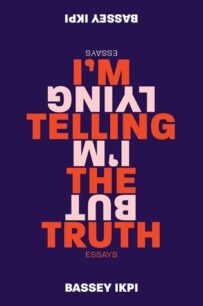

Kola Tubosun calls it "a kind of map for those interested in learning about how mental illness affects people. Essence described it as a "stunning essay collection". The book became a New York Times bestseller. The book, eventually renamed I'm Telling the Truth But I'm Lying was published in August 2019. On May 4, 2017, it was announced that her first book, a memoir titled Making Friends With Giants would be published by Harper Perennial in 2018. The book is described as "a deep personal work that chronicles the Nigerian-American author's life living with bipolar II disorder and anxiety, and a woman of color and combating the stigma surrounding it." The essays cover her difficulties as a young child re-locating from Nigeria to America, struggling with household tensions, depression and hospitalization, leading up to her eventual diagnosis of and treatment for bipolar II disorder. How does this shift in art form affect the narrative of her life, the possibilities of what can be spoken or written about, and how? Despite the ways that her memoir neglects these questions, Ikpi’s courage and candor in committing her story to narrative helps illuminate the complexities of her experience with a visceral and powerful intensity.I'm Telling the Truth but I'm Lying is a memoir by Nigerian spoken word artist Bassey Ikpi published by Harper Perennial an imprint of HarperCollins in 2019. Ikpi seems to have set aside the performative demands of the stage for the more intimate act of writing, and I have to wonder what this has been like. On the other hand, I wanted to hear more from the author about storytelling and language, some insight about the relationship between bipolar and poetry, particularly given her affinity for word play, communication, and creativity. I’ve been witnessing this journey long enough to know that bipolar does not lend itself to easy narrative closure, so I’m willing to set aside my desire for her 'broken' life to be made whole. Parts of I’m Telling the Truth, But I’m Lying seem written to fill in the gaps of chronology, to fulfill the reader’s desire to understand how Ikpi got from A to B, and these essays do not carry the same weight or thematic resonance as others. The result is a powerful, if at times elliptical, exploration of the disordered 'order' of living with bipolar.

This approach allows Ikpi to convey the fragmentation of her existence and to narrate her experience despite uncertainty about what happened and when. INSTANT NEW YORK TIMES BESTSELLER In Im Telling the Truth, but Im Lying Bassey Ikpi explores her lifeas a Nigerian-American immigrant, a black woman, a slam poet, a mother, a daughter, an artistthrough the lens of her mental health and diagnosis of bipolar II and anxiety. divides her story into chapters that read like individual essays-each one different in form yet linked together by theme and organized chronologically. Given this scarcity, Bassey Ikpi’s I’m Telling the Truth, But I’m Lying is a welcome addition.

Over the course of writing this review, I’ve counted nearly two dozen bipolar memoirs-a fascinating number in its own right-and yet very few of them have been penned by writers of color.


 0 kommentar(er)
0 kommentar(er)
